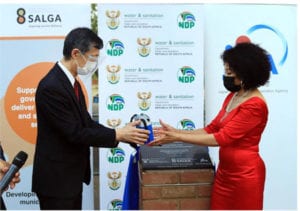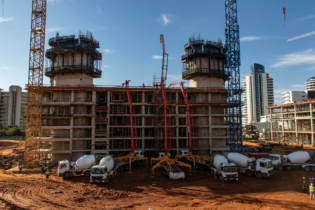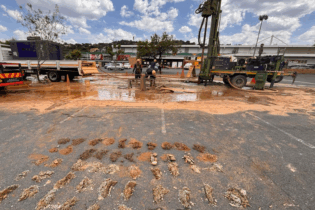The Japanese government has handed over a multimillion-rand training yard to South Africa’s Department of Water and Sanitation (DWS).
The Japanese Government, through the Japan International Cooperation Agency (JICA), funded the construction of the training facility at the Roodeplaat Training Centre of DWS. The Training Yard covers the basics of training artisans to deal with water losses in communities. The designs of the training yard were conducted by the DWS engineers with technical support from JICA. The training of artisans comes against the background of growing concerns about the huge amounts of water losses – estimated at R9 billion a year – in South Africa. A South African company was contracted by JICA to construct the Training Yard. DWS Engineers will handle all the activities including the maintenance of the Training Yard to ensure sustainability of the programme. The Training Yard is completed and ready to be handed over to the South African Government by the Japanese Government. Sisulu will take ownership of the Training Yard on Non-Revenue Water Management built by the Government of Japan from Ambassador Maruyama. Ambassador said the objective of his government’s assistance in South Africa’s water sector was to give support for skills development of local municipalities who are faced with challenges of water losses known as non-revenue water.“The area of non-revenue water is one of the major challenges Operation Vulindlela will drive the economic reform of South Africa. The Japanese assistance will help municipalities to improve their performance in water services and to address challenges of economic reforms at grass root level.”
The Ambassador described the training centre as “more than a skills development project we provide to the municipalities. It’s a skills development that enables economic reform.” Minister Sisulu said water was under extreme threat from a growing population, increasing demands of agriculture and industry and the worsening impacts of climate change. “The department and the South African Local Government Association (Salga) are faced with a similar challenge regarding the state of nonrevenue water in South Africa. The municipalities do not have the capacity and opportunity to train their officials on nonrevenue water and the country does not have a specific functional facility available to offer training. “It is clear that the Japanese model of non-revenue water management is the easiest in that it focuses mainly on the practical side of dealing with nonrevenue water than theory. We’ll continue to work with Salga, the Department of Cooperative Governance and Traditional Affairs, sector education and training authorities, and the metros in ensuring that this project delivers on its intended objectives,” she added.






